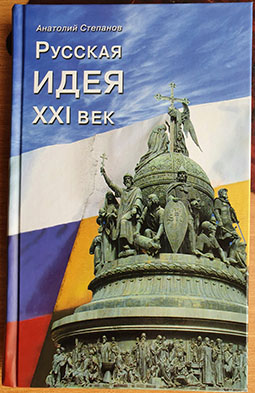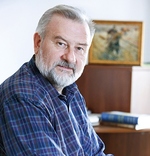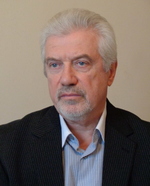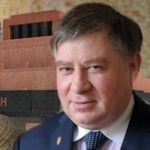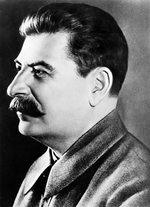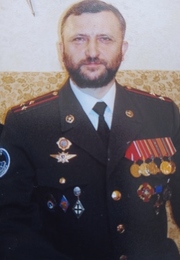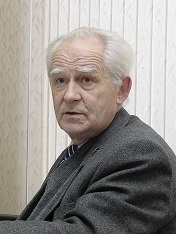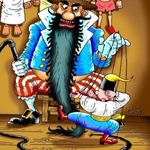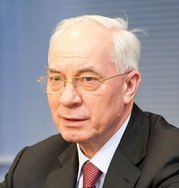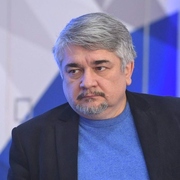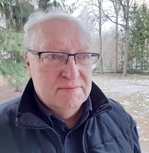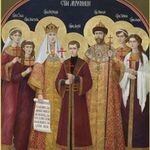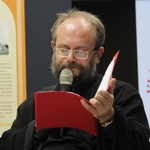Глупо и смешно будет выглядеть, если мы скажем, что через сто лет по территории Украины будут шествовать представители наций «регионалов», «батьковщинщиков», «ударников» или «славянопартийцев», но менее ста лет назад и украинцы были... ПАРТИЕЙ! Вы можете не верить нам, можете не верить научным источникам, но вряд ли современные «украинцы» не доверяют уважаемому ими «святому престолу».

Титульный лист 13 тома "Католической Энциклопедии".
Итак, «Католическая энциклопедия», изданная в 1913 году http://www.newadvent.org/cathen/, так описывает «украинцев»:
«...среди Русин Галиции и Венгрии были сформированы политические партии... Они разделены на три основные группы:
- «Украинцы», те, кто верит в развитие русин по собственной линии, независимой от России, поляков или немцев.
- «Москвофилы», те, кто смотрит на Россию, как на образец Русско-Славянской расы.
- «Угро-русские» или «Венгерские русины»,
те, кто выступает против Венгрии, против ее правил; те, кто не желают
потерять своего особого статуса... Идеи «украинцев» особенно неприятны
для них».
Вот так, из партии сепаратистов за век образовалась «нация» украинцев!
Вот подробнее - статья "Ruthenian (рутены, русены, русские)":


13-й том Католической Энциклопедии 1913 года в формате pdf:
The Catholic Encyclopedia Vol 13 1913 PDF 81 mb
Все исторические источники СССР и России на сегодняшней Украине объявлены "подделкой, выдумкой и москальской пропагандой". Поэтому вменяемый исторический диалог с новоукрами очень затруднён.
Ценность католической энциклопедии 1913 года в том, что она повторяет в точности то, чему мы учились в школах СССР. Оказывается, каварные коммунисты в школах нам говорили правду. :)
Вот только самим коммунистам идея украинского сепаратизма пригодилась и они её использовали в своих целях, а потом подло скрыли это. Но это уже другая история.
Католическая энциклопедия подтверждает, что:
- • Великая Россия издавна состояла из шведских, финских и славянских племён;
- • Украина - это слово, образованное от словосочетания "у края" для обозначения окраинных земель Российской Империи;
- • Территория России (нынешней Украины) после переноса столицы России из Киева в Москву стала называться Малороссией;
- • Русские жили на территориях вплоть до Австрии и Венгрии и из-за латинизации назывались "рутены" (русены, Ruthenian);
- • На территории Западной Украины (Буковина, Галичина, Волынь) жили русские и исповедовали христианскую ортодоксальную веру (ныне православие);
- • Малороссия была временно отделена от Великороссии и пять веков была в составе Польши и Литвы;
- • Идея сепаратизма в Малороссии возникла в начале 20 века на фоне революционных настроений в России;
- • Малоросский сепаратизм, "украинство", латинизацию, изобретение нового алфавита в Малороссии поддерживали власти Австро-Венгрии и Польши для полонизации русских и отделения их от Российской Империи;
- • На территории Малороссии и Австро-Венгрии появились три основных политических течения - украинцы, москвофилы и венгерские русины;
- • Великие малоросские писатели, такие как Гоголь и Шевченко, писали не на малоросском, а на великоросским языке;
- • Великоросский и малоросский языки происходят от общего древнеславянского языка. И хотя великоросский язык получил бОльшее развитие, зачастую именно малоросский язык оказывается ближе к древнеславянскому языку, используемому в литургиях ортодоксальной церкви.
http://en.wikisource.org/wiki/Catholic_Encyclopedia_%281913%29/Ruthenians (эта статья в оцифрованной версии энциклопедии на сайте WikiSource).
http://www.newadvent.org/cathen/13278a.htm (эта статья в оцифрованной версии энциклопедии на католическом сайте).
Ruthenians(Ruthenian and Russian: Rusin, plural Rusini)
A Slavic people from Southern Russia, Galicia and Bukowina in Austria, and North-eastern Hungary. They are also called in Russian, Malorossiani, Little Russians (in allusion to their stature), and in the Hungarian dialect of their own language, Russniaks. They occupy in Russia the provinces or governments of Lublin (Poland), Volhynia, Podolia, Kieff, Tehernigoff, Kharkoff, and Poltava, in Russia, and number now about 18,000,000. In Austria they occupy the whole of Eastern Galicia and Bukowina, and in Hungary the northern and north-eastern counties of Hungary: Szepes, Saros, Abauj, Zemplin, Ung, Maramaros, and Bereg, and amount to about 4,500,000 more. The Ruthenians along the borderland of the ancient Kingdom of Poland and the present boundary separating Austria from Russia proper are also called Ukrainians (u, at or near, and krai, the border or land composing the border), from the Ukraine, comprising the vast steppes or plains of Southern Russia extending into Galicia. In the Austro-Hungarian Empire the Ruthenians are separated from one another by the Carpathian Mountains, which leave one division of them in Galicia and the other in Hungary. The Ruthenians or Little Russians in Russia and Bukowina belong to the Greek Orthodox Church, whilst those of Galicia and Hungary are Greek Catholics in unity with the Holy See. For this reason the word Ruthenian has been generally used to indicate those of the race who are Catholics, and Little Russian those who are Greek Orthodox, although the terms are usually considered as fairly interchangeable. It must be remembered that in the Russian and Ruthenian languages (unlike in English) there are two words which are often indiscriminately translated as Russia, but which have quite different meanings. One is Russ, which is the generic word denoting an abstract fatherland and all who speak a Russo-Slavic tongue, who are of Russo-Slavic race and who profess the Greek-Slavonic Rite; it is of wide and comprehensive meaning. The other word is Rossia, which is a word of restricted meaning and refers only to the actual Russian Empire and its subjects, as constituted today. The former word Russ may be applied to a land or people very much as our own word "Anglo-Saxon" is to English or Americans. It not only includes those who live in the Russian Empire, but millions outside of it, who are of similar race or kin, but who are not politically, religiously, or governmentally united with those within the empire. From the word Russ we get the derivative Russky, which may therefore be translated in English as "Ruthenian" as well as "Russian", since it is older than the present Russian Empire. From Rossia we have the derivative Rossiisky, which can never be translated otherwise than by "Russian", pertaining to or a native of the Russian Empire. Indeed the word "Ruthene" or "Ruthenian" seems to have been an attempt to put the word Rusin into a Latinized form, and the medieval Latin word Ruthenia was often used as a term for Russia itself before it grew so great as it is today.
The name Ruthenian (Rutheni) is found for the first time in the old Polish annalist, Martinus Gallus, who wrote towards the end of the eleventh and the beginning of the twelfth century; he uses this name as one already well known. The Danish historian, Saxo Grammaticus (1203), also uses it to describe the Slavs living near the Baltic Sea. These Slavs were already converted to Christianity and the name was probably used to distinguish them from the pagans. The term Ruthenian was well known in the eleventh century and its origin seems to be considerably older. It is said to have really originated in the southern part of Gaul in the time of Charlemagne. When the Huns overran Europe in the fifth century, they subdued the Slavic tribes with whom they came in contact and made them a part of their victorious army. Under Attila's leadership they pressed still farther west, devastating everything in their path, and penetrated into Northern Italy and the south-eastern part of Gaul. In the great battle at Cha^lons the Christian armies overcame them; a portion of the Huns' forces was slaughtered, but other portions were divided and scattered in small detachments throughout the country, and the greater part of these were the Slavs who had been made captive and forced to join the army. After the death of Charlemagne they had settled largely throughout the land, and their names are still retained in various Latin names of places, as Rouerge (Provincia Ruthenorum), Rodez (Segdunum Rutheni), and Auvergne (Augusta Ruthenorum). As these Slavic tribes furnished the name for the Latin writers of Italy and France, this same word was also used later in describing them in their native land, where descriptions came to be written by western writers who first came in contact with them. Indeed the word "Ruthenian" is considerably older than the word "Russian", in describing Slavic nationality; for the term Russia (Rossia), indicating the political state and government, did not come into use until the fourteenth or fifteenth century.
The Ruthenians may well claim to be the original Russians. Theirs was the land where Sts. Cyril and Methodius converted the Slavic peoples, and that land, with Kieff as the centre, became the starting point of Greco-Slavic Christianity, and for centuries that centre was the religious and political capital of the present Russia. Great Russia was then merely a conglomerate, of Swedish, Finnish, and Slavic tribes, and although it has since become great and has subdued its weaker brethren, it does not represent the historic race as does the Ruthenian in the south. They were never so thoroughly under the rule of the conquering Tatar as the Great Russians of Moscow, Vladimir, and Kazan. Besides, Little Russia was separated from Great Russia and was for nearly five centuries subject to Poland and Lithuania. Yet Great Russia has become in Russia the norm of Russian nationality, and has succeeded largely in suppressing and arresting the development of the Little Russians within the empire. It is no wonder that the old dreams of Mazeppa, Chmielnicki, and Shevchenko of Little Russia, independent both of Russia and Poland, have found a lodgment in the hearts of the Southern Russians; the same feeling has gained ground among the Ruthenians of Galicia and Hungary, surrounded as they are by the German, Polish, and Hungarian peoples. However, the milder and more equitable rule of Austria-Hungary has prevented direct political agitation, although there is occasional trouble. The resultant of such forces among the Ruthenians of Galicia and Hungary has been the formation of political parties, which they have brought to America with them. These may be divided into three large groups: the Ukraintzi, those who believe in and foster the development of the Ruthenians along their own lines, quite independent of Russia, the Poles or the Germans, and who actually look forward to the independence of Little Russia, almost analogous to the Home Rulers of Ireland; the Moscophiles, those who look to present Russia as the norm of the Russo-Slavic race and who are partisans of Panslavism; these may be likened to the Unionists of Ireland, in order to round out the comparison; the Ugro-Russki, Hungarian Ruthenians, who while objecting to Hungary, and particular phases of Hungarian rule, have no idea of losing their own peculiar nationality by taking present Russia as their standard; they hold themselves aloof from both the other parties, the ideas of the Ukraintzi being particularly distasteful to them. (See GREEK CATHOLICS IN AMERICA.) In Russia all political agitation for Little Russia and for Little Russian customs and peculiarities is prohibited; it is only since 1905 that newspapers and other publications in the Little Russian language have been permitted. It was Little Russia which united with the Holy See in 1595, in the great reunion of the Greek Church; and it was in Little Russia where the pressure of the Russian Government was brought to bear in 1795, 1839, and 1875, whereby the Greek Catholics of Little Russia were utterly wiped out and some 7,000,000 of the Uniats there were compelled, partly by force and partly by deception, to become part of the Greek Orthodox Church.
In some indefinable manner the Ruthenian or Little Russian speech is considered as leading away from Russian unity, whether of State or Church; the prompt return of a quarter of a million of Little Russians to Catholicism in 1905-06, at the time of the decree of toleration, perhaps lends countenance to the belief in Russian minds. The Ruthenian language is very close to the Russian and both are descendants of the ancient Slavonic tongue which is still used in the Mass and in the liturgical books. The Ruthenian, however, in the form of its words, is much nearer the Church Slavonic than the modern Russian language is. Still it does not differ much from the modern Russian or the so-called Great Russian language; it bears somewhat the same relation to the latter as the Lowland Scotch does to English or the Plattdeutsch to German. The Ruthenians in Austria-Hungary and the Little Russians in Russia use the Russian [Cyrillic --Ed.] alphabet and write their language in almost the same orthography as the Great Russian, but in many cases they pronounce it differently. It is almost like the case of an Englishman and a Frenchman who write the word science exactly alike, but each pronounces it in a different manner. Many words are unlike in Ruthenian and Russian, for example, bachiti, to see, in Ruthenian, becomes videt in Russian; pershy, first, in Ruthenian, is pervy in Russian. All this tends to differentiate the two languages, or extreme dialects, as they might be called. In late years a recession of the Russian alphabet in Galicia and Bukowina has provoked much dissension. For the purpose of more closely accommodating the Russian alphabet to the Ruthenian, they added two new letters and rejected three old ones, then spelled all the Ruthenian or Little Russian words exactly as they are pronounced. This "phonetic" alphabet differentiates the Ruthenian more than ever from the Russian. It has divided Ruthenian writers into two great camps: the "etymological", which retains the old system of spelling, and the "phonetic", which advocates the new system. It has even been made a basis of political action, and the phonetic system of orthography is still strongly opposed, partly because it was an Austrian governmental measure and partly because it is regarded as an effort to detach the Ruthenians from the rest of the Russian race and in a measure to Polonize them. The phonetic system of writing has never been adopted among the Hungarian Ruthenians, and it is only within the last two or three years that anyone has dared to use it in Little Russian publications issued in the Russian Empire. Yet in many parts of Hungary the Ruthenian language is printed in Roman letters so as to reach those who are not acquainted with the Russian alphabet. The language question has led to many debates in the Austrian parliament and has been taken up by many Ruthenian magazines and reviews. The Ruthenians have also brought their language and political difficulties with them to America (see GREEK CATHOLICS IN AMERICA: Ruthenian Greek Catholics), where they encounter them as obstacles to racial progress. Not only in history but in literature have the Ruthenians or Little Russians held an honourable place. Their chief city, Kieff, was the capital of the country before Moscow was founded in the middle of the twelfth century. A portion of them led the wild, stirring life of the Cossacks, painted in Gogol's romance of "Taras Bulba"; their revolt under Chmielnicki in 1648 is pictured by Sienkiewicz in his historical romance "With Fire and Sword"; that of half a century later under Mazeppa is made known to most of us by Byron's verse. They had free printing presses for secular as well as religious literature in the sixteenth century; still many of their best writers, such as Gogol, have used the Great Russian language even when their themes were Little Russian, just as so much of the text of Scott's Scotch novels is pure English. The Ruthenian language, however, has been employed by authors of international repute, the greatest of whom is the poet Shevehenko. Other authors of widening reputation have followed in the present century, and some like Gowda have transferred their literary efforts to American soil.
The Ruthenian Greek Catholic Church in Austria-Hungary is represented by one province in Galicia, Austria, and three dioceses in Hungary. The former is composed of the Greek Archdiocese of Lemberg with the two subordinate dioceses of Przemysl and Stanislau. In Hungary there are the separate dioceses of Eperies and Munka'cs in the north and the Diocese of Kreutz (Crisium, Krizevac) in the south. These northern two are subject to the Latin Archbishop of Gran, and the southern one to the Latin Archbishop of Agram. The Ruthenian immigration to America comes almost wholly from these dioceses, and their efforts and progress in solidly establishing themselves in the United States and Canada have been described. They have built many fine and flourishing churches, have established schools and now have a bishop here of their own rite (see GREEK CATHOLICS IN AMERICA). Some of them are becoming wealthy, and in some places in Pennsylvania are reckoned as a factor in American politics. Nevertheless, they have been subjected in America to strenuous proselyting, both on the part of the Russian Orthodox mission churches, which preach Panslavism in its most alluring forms, and which are at times bitterly hostile to Catholicism (see GREEK ORTHODOX CHURCH IN AMERICA, under Russian Orthodox), and on the part of various Protestant missionary activities, which have succeeded in establishing in many localities "independent" Ruthenian communities apparently practising the Greek Rite in connexion with the Presbyterian, Baptist, and other churches. Much has been effected by both proselyting parties because of a lack of a suitable Ruthenian Catholic press and literature, and of sufficient priests. For instance, there is a Protestant catechism using the name of the Catholic Church and teaching the seven sacraments, and there are Protestant so-called evangelical missionaries who use vestments, candles, censers, crucifixes, and holy water, with apparently all the Greek Catholic ritual, having even the official Greek Catholic mass-books on the altar. The Russian Orthodox clergy find the task even easier, for they appeal to the Slavic national feeling and adopt the usual religious practices of the Greek Catholic clergy, and are thus enabled to win over many an immigrant by offering sympathy in a strange land.
SourcesHRUSZEWSKI, Gesch. des Ukrainischen (Ruthenischen) Volkes (Leipzig, 1906); ROMANCZUK, Die Ruthenen u. ihre Gegner in Galizien, (Vienna, 1902); JANDAUREK, Das Königreich Galizien u. Lodomeriem, u. das Herzogthum Bukowina (Vienna, 1884); PELESZ, Gesch. der Union, I (Vienna, 1878); SEMBRATOWICZ, Das Zarenthum im Kampfe mit der Civilisation (Vienna, 1905); FRANZOS, Aus Halb-Asien; Culturbilder aus Galizien, der Bukowina u. Süd Russland (Berlin, 1878); Charities, XIII (New York, Dec., 1904); The Messenger, XLII, Sept.-Dec. (New York, 1904); GRUSHEVSKY, Istoria Ukraini-Rusi (Lemberg, 1904-11).
About this pageAPA citation. Shipman, A. (1912). Ruthenians. In The Catholic Encyclopedia. New York: Robert Appleton Company. Retrieved April 27, 2014 from New Advent: http://www.newadvent.org/cathen/13278a.htm
Кроме статьи Ruthenians представляет интерес статья The Slavs
В статье The Slavs - перечисление и описание славянских племён - Венеды, Русские, Поляки и т.д. ... но никаких "древних укров" католическая энциклопедия не знает.









